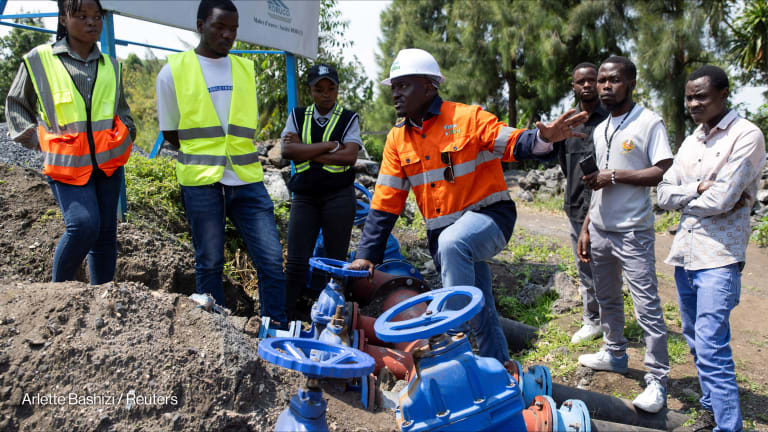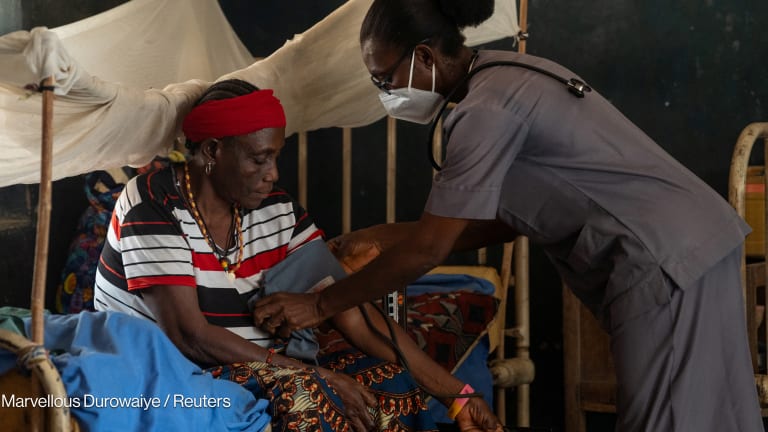How MCC plans to spend almost $550 million in the coming months
MCC works with the world’s lowest-income countries toward poverty reduction by investing in activities promoting economic growth.
On May 6, the Millennium Challenge Corporation, the United States government’s agency that works with the world’s lowest-income nations on poverty reduction, released its latest midyear business forecast for 2024. MCC mostly provides large, long-term grants through agreements known as compacts, in low- and middle-income countries, but it also tenders several contracts to support this work. The report provides relevant information to potential bidders for those contracts, including the procuring department, maximum budget, and procurement method, for opportunities worth at least $250,000. Overall, MCC has 187 contracts in its pipeline, worth a maximum value of $546.5 million. We looked into the data to see where the agency plans to spend its money. Who’s procuring the contracts? The Department for Compact Operations, which manages the overseas missions, has the biggest budget, worth $266.2 million for 100 opportunities — 48.7% of the total. The Department of Administration and Finance ranked second, with $147 million. Then the Department of Policy and Evaluation, with $130 million; the Office of the General Counsel, with $2 million; and the Department of Congressional and Public Affairs, with $1.2 million. Which opportunities are available for bidders? Of the 187 opportunities on the list, 73 contracts, worth $154.2 million, are still in the planning stage. Another 39 opportunities, worth $145.2 million, have already been approved; six opportunities, worth $22 million, are in the solicitation stage; and 58 opportunities, worth $194 million, have been awarded. A total of 11 opportunities, worth $31 million, have been canceled, but the forecast didn’t disclose the reasons for the cancellation. What are the geographical and sectoral priorities? The MCC data does not assign opportunities by sector, while for the geography, we found that some multicountry or regional opportunities were not correctly classified. To better map the forecast, we reviewed each of the contracts on the list to identify their target sectors and locations. Based on our analysis, 77 opportunities in the pre-solicitation stage, worth $225.2 million, will be procured in the U.S. Many of these are for the procurement of consulting services to support MCC’s operations. Côte d’Ivoire received the largest allocation among partner countries, with $21 million for five opportunities. Solomon Islands, Mauritania, and Benin ranked next, receiving $6 million each. By sector, gender and social inclusion is the priority, with $34 million for 14 opportunities. The transportation sector came next, with $23.2 million for eight opportunities. Then agriculture, with $21 million; energy, with $18 million; and education, with $13 million. Overview: MCC PCBF In February, MCC also published its Partner Country Business Forecast — which is similar to its business forecast, except that the partner countries themselves manage it. The report has limited information and does not include the planned budget. However, according to MCC, the opportunities on the list typically cost over $200,000. Among countries, Malawi recorded the highest number of forecasted contracts, with 16 opportunities. Lesotho ranked next, with 12 planned contracts; Nepal, with 10 opportunities; and Belize, with seven. The transport and logistics sector has the most contracts, with 18 planned procurements. Public sector management and governance followed, with 14 opportunities. Then energy, with 12 contracts; education, with eight contracts; and institutional reforms, with six contracts. Try out Devex Pro Funding today with a free five-day trial, and explore funding opportunities from over 850 sources in addition to our analysis and news content.
On May 6, the Millennium Challenge Corporation, the United States government’s agency that works with the world’s lowest-income nations on poverty reduction, released its latest midyear business forecast for 2024.
MCC mostly provides large, long-term grants through agreements known as compacts, in low- and middle-income countries, but it also tenders several contracts to support this work.
The report provides relevant information to potential bidders for those contracts, including the procuring department, maximum budget, and procurement method, for opportunities worth at least $250,000.
This story is forDevex Promembers
Unlock this story now with a 15-day free trial of Devex Pro.
With a Devex Pro subscription you'll get access to deeper analysis and exclusive insights from our reporters and analysts.
Start my free trialRequest a group subscription Printing articles to share with others is a breach of our terms and conditions and copyright policy. Please use the sharing options on the left side of the article. Devex Pro members may share up to 10 articles per month using the Pro share tool ( ).
Miguel Tamonan is a Senior Development Analyst at Devex, where he analyzes data from public and private donors to produce content and special reports for Pro and Pro Funding readers. He has a bachelor’s degree in Political Science with a Major in International Relations from the Polytechnic University of the Philippines.








